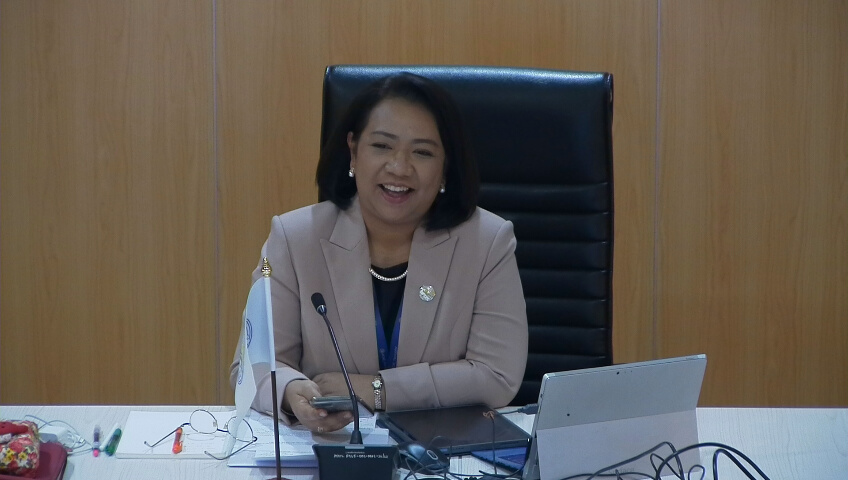_2.png)
Regional Forum on Geospatial Information Application for Agricultural Monitoring in South-East Asia hosted by Yunan University was held in Kunming, China, Secord Segment (Technology, Institution and, Policy) on November 30 – December 1, 2023.
On this occasion, Ms. Tiziana Bonapace Director, of Information and Communication Technology and Disaster Risk Reduction Division (ESCAP) and Mr. Zhuang Yan, Chinese Academy of Science (tbt) delivered the opening remarks to all participants. The workshop was attended by representativesof the ASEAN member countries the Alliance of International Science Organizations (ANSO), the Aerospace Information Research Institute of the Chinese Academy of Sciences (AIRCAS), Group on Earth Observations Global Agriculture Monitoring (GEOGLAM), the Geo-Informatics and Space Technology Development Agency (GISTDA), and the ASEAN Research and Training Center for Space Technology and Applications (ARTSA), as well as the AFSIS Secretariat.
.png)
.png)
On 30th November, the session of High-Level Panel discussion on potential adoption and replication in South-East Asian Countries, Dr. Sumanya Ngandee, AFSIS Manager, shared the experience of AFSIS (ASEN Food Security Information), our project that corroborates with plus 3 counties, and the new framework that we provide AFSIS to become the international organization and national cooperation agency in the future to the participants.


At the meeting on 1st December, the presentation session was about the case studies and discussion led by representatives of ASEN member countries and the Crop Bio Project Meeting in the afternoon. This session provided a ton of knowledge that will be useful in the future.
In addition, this meeting went well and received the attention of the participants. This is in line with AFSIS's ambition to demonstrate the importance of the project and the importance of food security information.
.png)
.png)
.png)
.jpg)
On 13–15 January 2026, the Office of Agricultural Economics (OAE), Thailand, in collaboration with the Ministry of Agriculture, Forestry and Fisheries (MAFF), Japan, and the AFSIS Secretariat, conducted the 1st Meeting of Japan–Thailand Expert Dialogue on Agricultural Statistics. The meeting was held at the Office of Agricultural Economics and field survey activities in Chonburi Province.

On 3–4 December 2025, the ASEAN Food Security Information System (AFSIS) Secretariat participated in the ASEAN Plus Three Emergency Rice Reserve (APTERR) Table Top Exercise (TTX) held in Bandar Seri Begawan, Brunei Darussalam.
/LINE_ALBUM_KRC_Cambodia_251204_13.jpg)
AFSIS and Development of Human Resources" in Cambodia On 27 November 2025, Mr. Charapon Chantorn, Deputy AFSIS Manager, participated in the Completion and Handover Ceremony of the project “Establishing the Real-Time ASEAN Food Security Information System (AFSIS) and Development of Human Resources, Phase 3 – Pilot Project on Strategic Crop Forecasting System for Food Security in Cambodia.” The ceremony was held in Phnom Penh, Cambodia, and jointly hosted by the Ministry of Agriculture, Food and Rural Affairs (MAFRA) of the Republic of Korea, the Ministry of Agriculture, Forestry and Fisheries (MAFF) of Cambodia, and the Korea Rural Community Corporation (KRC).

AFSIS Participated in APRSAF-31 to Strengthen Space Technology Cooperation for Regional Food Security On 18–19 November 2025, in Cebu City, the Republic of the Philippines, the ASEAN Food Security Information System (AFSIS) Secretariat, represented by Mr. Charapon Chantorn, Deputy AFSIS Manager, participated in the 31st Asia-Pacific Regional Space Agency Forum (APRSAF-31). The Forum, a key platform for promoting regional cooperation in space technology across the Asia-Pacific region, was co-organized by the Philippines Space Agency (PhilSA), the Ministry of Education, Culture, Sports, Science and Technology (MEXT) of Japan, and the Japan Aerospace Exploration Agency (JAXA).